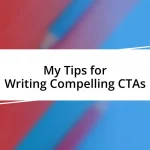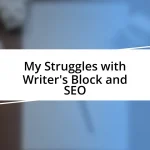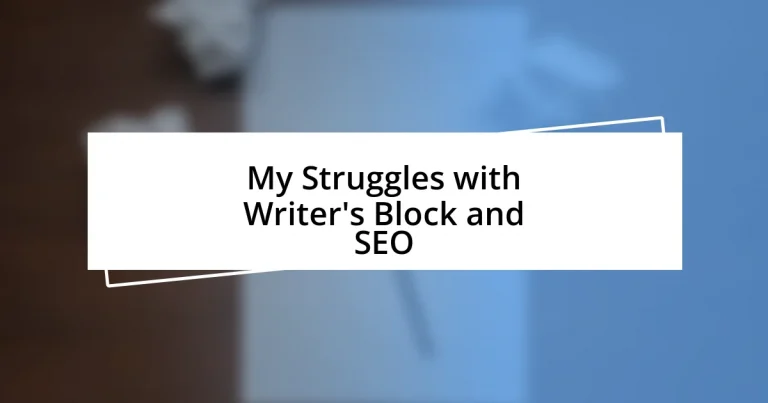Key takeaways:
- Writer’s block often arises from self-doubt, external pressures, and disinterest, making it essential to recognize these triggers to overcome it.
- Effective strategies to combat writer’s block include free writing, changing your environment, and embracing imperfection to foster creativity.
- Balancing creativity with SEO enhances writing quality and visibility, allowing for authentic expression while still reaching the target audience.

Understanding Writer’s Block
Writer’s block can feel like an insurmountable wall, isolating us from our creativity. I remember staring at a blank screen for hours, my thoughts swirling but refusing to land on anything concrete. It’s frustrating—and often disheartening—when ideas slip through my fingers just as I think I’m about to grasp them.
There are moments when self-doubt creeps in, amplifying the struggle. Have you ever doubted your voice or felt like your words just didn’t matter? I’ve faced that very battle, questioning whether I was truly cut out to share my thoughts. It’s in these moments that I’ve learned to recognize that the struggle is part of the creative process, not a sign of failure.
Interestingly, writer’s block often stems from external pressures, like deadlines or expectations. I recall a time when the weight of SEO metrics and audience engagement metrics seemed to overshadow my creativity. Instead of writing from my heart, I found myself obsessing over keywords, which only intensified my block. This experience taught me the importance of balancing creativity with strategy, something that takes time and practice.

Common Causes of Writer’s Block
When I think about what triggers writer’s block, I often pinpoint fear as a significant player in the game. It’s the anxiety of not meeting expectations—whether my own or those of others—that can paralyze my creativity. I remember sitting down to write for a project, convinced that if it wasn’t perfect, it would be a failure. This line of thinking can create a vicious cycle that becomes harder to escape with each reluctant keystroke.
Another common cause can be burnout, which sneaks up on all of us from time to time. I vividly recall a period when I was juggling multiple writing tasks without taking a proper break. My brain felt foggy, and instead of ideas flowing, I faced a harsh silence that was both maddening and exhausting. It was essential for me to step back, recharge, and allow my mind some space to breathe and reset.
Lastly, disinterest can also lead to writer’s block. I’ve found that if I’m not passionate about a topic or project, my enthusiasm dwindles. For instance, working on an assignment that lacked personal significance made me dread each writing session. Recognizing this has taught me the power of choosing projects that resonate with me—I write much more freely when my heart is in it.
| Cause | Description |
|---|---|
| Fear | Anxiety over meeting expectations can paralyze creativity. |
| Burnout | Exhaustion from overworking diminishes the ability to write. |
| Disinterest | Lack of passion for a topic leads to decreased motivation. |

Strategies to Overcome Writer’s Block
I’ve experimented with various strategies to break through writer’s block, and some have proven remarkably effective for me. One approach is to simply set a timer for ten minutes and write without stopping. I recall a day when I felt completely stuck, so I challenged myself to pour out any thoughts that came to mind, no matter how disjointed. It turned out to be liberating! The key here is to keep the pen moving or your fingers typing, allowing ideas to flow freely without judgment.
Another method that has worked for me is integrating movement into my routine. Sometimes, stepping away from my writing desk to take a short walk can spark inspiration. I remember the times I returned from a stroll, fresh air filling my lungs, with new ideas racing through my head. It’s as if the physical movement opens up mental pathways, allowing creativity to seep back in.
Here are some practical strategies to tackle writer’s block:
- Free Writing: Set a timer and write whatever comes to mind without self-editing.
- Change Your Environment: Move to a different space, perhaps a café or park, to gain a fresh perspective.
- Break Tasks Down: Tackle smaller sections rather than the whole piece, making it feel less overwhelming.
- Embrace Imperfection: Allow yourself to write poorly at first; you can always revise later.
- Engage in Creative Activities: Try drawing, playing music, or any other art form to get those creative juices flowing.
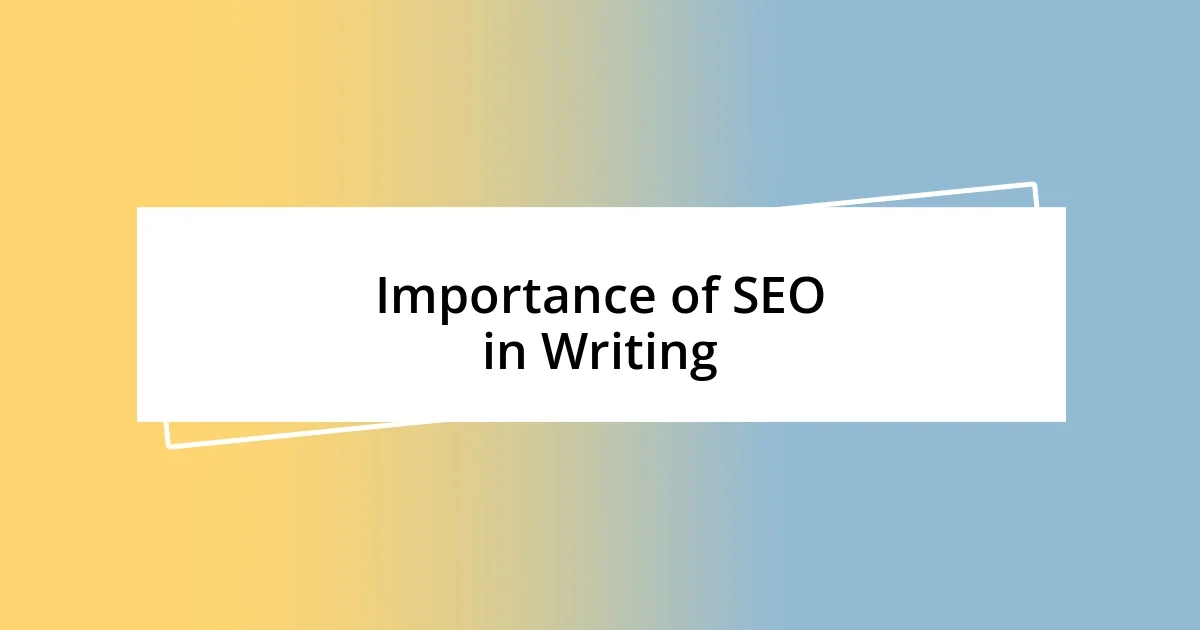
Importance of SEO in Writing
The importance of SEO in writing cannot be overstated. From my experience, effective SEO strategies ensure that my content reaches the intended audience. I remember the excitement of seeing a blog post gain traction after applying relevant keywords. It felt rewarding to know my work resonated with readers because of the visibility SEO provided.
Incorporating SEO is like whispering to search engines, guiding them to understand what my content is all about. For instance, I’ve found success in using long-tail keywords—phrases that are more specific and less competitive. This tactic not only improves my rankings but also attracts a niche audience genuinely interested in what I have to say. Have I ever considered writing without SEO? Absolutely, but each time I’ve tried, my work essentially sat unnoticed in the vast digital sea.
Moreover, SEO shapes the way I structure my writing. I’ve learned that organizing my content with headers, bullet points, and engaging meta descriptions makes it more digestible for readers and search engines alike. There’s something empowering about crafting articles that serve both audience needs and benefit from search algorithms. It’s a delicate balance, but one that, when struck, brings satisfaction and visibility to my creative efforts.

Balancing Creativity with SEO
Finding the right balance between creativity and SEO can sometimes feel like walking a tightrope. I remember tackling a project where I was so focused on stuffing in keywords that I nearly lost my unique voice. The moment I decided to prioritize authenticity in my writing, while still considering SEO, everything clicked. It taught me that my audience deserves engaging content, not just a string of keywords.
When I’m creatively brainstorming, I often jot down ideas that excite me before I even think about SEO. It’s a little ritual that gets my juices flowing, and then I weave in keywords later. I can’t stress enough how liberating it is to let creativity thrive first. It feels much more genuine when the words reflect my voice, and then I refine them to align with what search engines are looking for. Isn’t it fascinating how a little preparation upfront can lead to a more organic flow later?
It’s vital to remember that creativity isn’t stifled by SEO; rather, it can be enhanced. I’ve had moments where a simple, catchy title, crafted with thoughtful SEO in mind, unlocked more opportunities for my pieces to be shared. I’ve come to view SEO not as a set of restrictions, but as a framework empowering my creativity to reach a wider audience. It’s all about opening doors while staying true to what inspires me. What’s your experience with blending the two?

Tools to Enhance Writing Flow
One of the tools I swear by to enhance my writing flow is a distraction-free writing app. Whenever I sit down to write, the last thing I want is to be distracted by notifications or a cluttered screen. I remember a time when I used a minimalist writing platform, and it felt like a breath of fresh air. I could focus solely on my words, and that clarity propelled my creativity. Have you ever tried writing in a space with no distractions? It’s incredible how much more productive I became!
Another gem in my toolkit is voice-to-text software. At first, I was skeptical—how could talking out loud be as effective as typing? However, I soon discovered that articulating my thoughts verbally often led to richer and more spontaneous ideas. I recall a moment when I was struggling with writer’s block; as soon as I started speaking my thoughts, the words just flowed. It was fascinating to see how my brain worked in real-time. Have you ever considered how your thoughts might change if you speak them instead of typing?
Lastly, I can’t praise brainstorming and mind-mapping tools enough. They allow me to visually organize my ideas, unlocking connections I might not have seen otherwise. I recently used a mind-mapping app to plot out a lengthy article. Watching my ideas branch out was exhilarating! It felt like I was connecting the dots in a way that transformed my initial thoughts into a coherent structure. Have you ever tried mapping out your ideas like this? The clarity it brought to my writing process was truly game-changing!
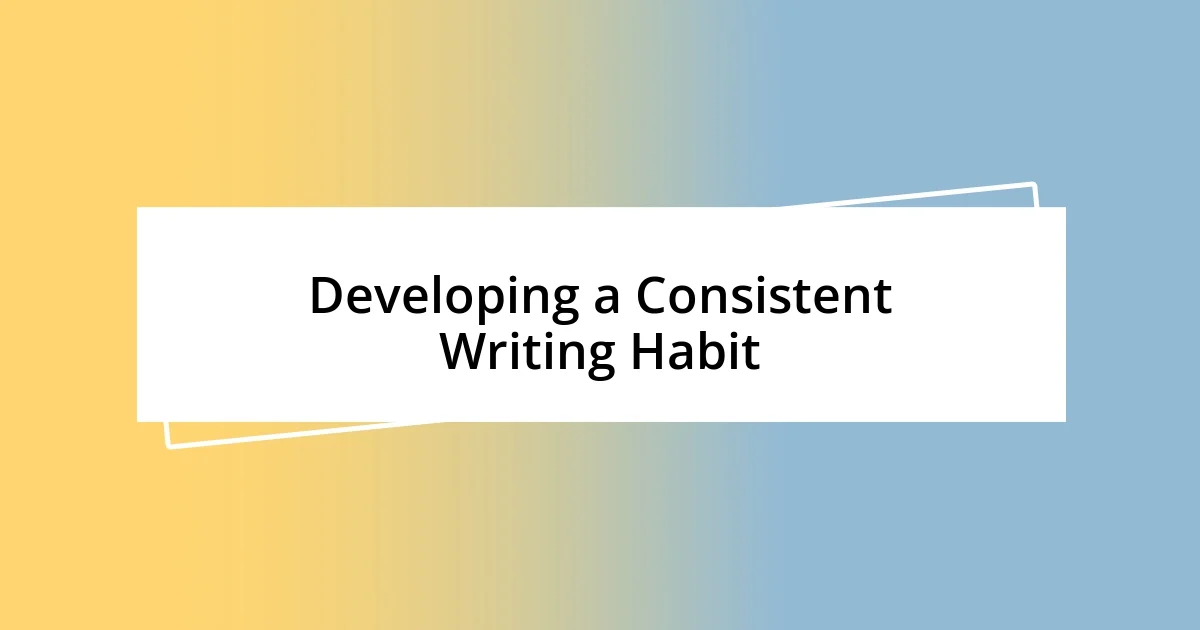
Developing a Consistent Writing Habit
I’ve found that developing a consistent writing habit is about more than just setting a schedule; it’s about creating an environment that fosters creativity. I remember when I committed to writing every morning before my day got hectic. That quiet time soon became sacred, allowing my thoughts to flow without interruption. Have you ever experienced that peaceful solitude when inspiration strikes? It really does make a difference.
Another trick that works wonders for me is setting achievable goals. Instead of aiming to write an entire article in one go, I break it down into manageable chunks—just a paragraph or two at a time. I’ve noticed that this approach not only reduces pressure but also helps me maintain momentum. Do you ever find it daunting to tackle long writing projects all at once? Trust me, spreading it out into smaller sessions can make the process feel so much lighter.
Lastly, I try to capture ideas whenever they strike, even if I’m away from my writing desk. I keep a note-taking app on my phone for those moments when a thought pops up unexpectedly. I can’t count how many times a simple idea during my commute turned into a fully fleshed-out piece later. Isn’t it fascinating how a fleeting thought can blossom into something substantial? Embracing this spontaneity keeps my creativity alive and reinforces my writing habit in a way that feels natural and fulfilling.



